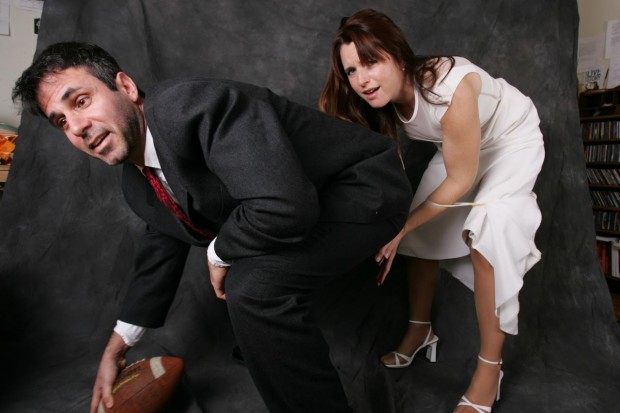
Guest contributor: Debora Black
Table for Two: Debora Black talks with Steve Almond about Football, Hate Mail, Life, and Art
categories: Cocktail Hour / Table For Two: Interviews
3 comments

Debora: Steve you’re everywhere—The Best American Short Stories, The Pushcart Prize, The New York Times Magazine’s Riff, The Rumpus online magazine, and you host the Dear Sugar podcasts with Cheryl Strayed. You are into journalism, fiction, life advice, and politics. You are Football, candy, rock and roll, hate letters, open letters, writing strategies, and book reviews. What is your mission as a writer, what impulses drive your work?
Steve: Oh, I’m like the rest of you suckers. I have this persistent dream that I’ll build a bridge of love to the rest of the species. For the most part, I chase my obsessions down.
Debora: Do you feel most at home within any of your past or present writing roles?
Steve: Well, I admire the folks who sort of go where the energy takes them. Vonnegut, for example. He wrote all kinds of shit. Stories. Novels. Plays. Articles. Dispatches. Speeches. Sermons. Jeremaids. I feel at home whenever the muse is lending a hand, when I’m not just pushing the language around. If I were left to my own devices, I’d destroy all the devices. Wait a second. What I’d do is write short stories.
Debora: You’ve done some interesting self-publishing. Tell us about that material and why you self-published.
 Steve: Oh, I just got tired of putting out books as part of the writer/publisher arranged marriage, tired of all the complaints about the dowry and the dishes, and my art getting trampled by the profit motive and blah-blah-blah. So I had these little books I wanted to write and put in the world and I got my pal Brian Stauffer to help out. He’s maybe the best illustrator on earth. And I carry them around to readings in a little satchel and sell them like drugs. It’s all very street.
Steve: Oh, I just got tired of putting out books as part of the writer/publisher arranged marriage, tired of all the complaints about the dowry and the dishes, and my art getting trampled by the profit motive and blah-blah-blah. So I had these little books I wanted to write and put in the world and I got my pal Brian Stauffer to help out. He’s maybe the best illustrator on earth. And I carry them around to readings in a little satchel and sell them like drugs. It’s all very street.
Debora: In your 2006 publication of An Open Letter to William P. Leahy at Boston College you bring together two platforms that interest me greatly, politics and education. Your letter protests the administration’s decision to invite Condoleezza Rice to speak at that year’s commencement ceremony. There was some division on this within the student body and the public. People on both sides of the argument expressed feelings of anger and deep disappointment over the controversy, which seems an unfortunate mood for a commencement ceremony. This makes me ask the larger question, is it okay for any political figure to speak at a commencement, considering the diversity of beliefs and values likely held by the members of a student body? What is your take-away from the entire experience?
Steve: Oh please. Condoleezza Rice is on the board of Exxon Mobil. She lied her head off to get us into a stupid, reckless war that killed a lot of people and destroyed a lot of lives. She was shopping for shoes in NYC while thousands of people were drowning in New Orleans. A person like that shouldn’t be invited on-stage as a moral exemplar. I’d have said the same thing about Bush or Cheney or Rumsfeld—any of those callous bastards.
Debora: Steve, the word is still getting out—I hadn’t heard about the Dear Sugar podcasts until a few months ago. I binged on all of them over the course of two days, so now I’m all caught up. It’s a great show. Describe for us your format and intentions.
Steve: Cheryl Strayed and I get a lot of very intense letters from people struggling with big issues in their lives and we just sit there and talk about them, often inviting a guest to help us be less stupid in our talk. We’re not trying to give advice, or heal people so much as giving people permission to feel what they feel, which is often dark and intense.
Debora: Just when I started watching and enjoying football, I began hearing some studied opinions that seemed to validate the reasons why I never liked football in the first place. Your latest book, Against Football: One Fan’s Reluctant Manifesto, offers a comprehensive look into that world, and I find the content compelling on many levels, even if I don’t find myself in complete agreement on some points. What is the principle concern, or concerns, under discussion in your book?
Steve: I love football as a form of entertainment, and have for 40 years. But as a moral undertaking it’s just atrocious, in the sickening violence absorbed by the players, in the medieval values it imparts, in the nihilistic greed of the industry that has grown up around the game, and the way it’s warped our educational system. Really, it’s just a sickening arrangement when you look at it for what it is. That’s all my book is trying to do: get folks to see it for what it is.
Debora: I have to confess that my original reasons for not liking football did not include the violence on the field. I figured that if guys wanted to play, that was their choice. It’s notable, though, the line of thinking you bring to this concept of individual choice as it pertains to football. Would you explain a little of this?
Steve: It’s not about the players choosing to play. It’s about us fans—who incur none of the risk—choosing to watch a game so dangerous that the players get brain damage. On some level, it’s that simple. What gives us the right? And by assuming that right, what have we given up, in terms of our capacity for mercy.
Debora: My guess is that it’s not easy to take on the NFL or Boston College or other matters in such direct and honest ways. Tell us about your book, Letters From People Who Hate Me.
Steve: It’s just a bunch of hate mail I’ve gotten and my responses. I find hate mail very moving. It’s violent and crazy, but it’s also deeply confessional. My correspondents are telling me the truth – about how they see the world. It’s not this airbrushed Fox News version of the right-wing id. It’s the real monster.
Debora: In Against Football you show us an NFL powerhouse that hasn’t been talking straight to its players or the public regarding injury and long-term consequences. You show us a media that soft-pedals their questions and commentary related to NFL injury and its trickle-down to the college and high school game. And you show us a White House that hedges while making statements on violence levels and safety policies of youth games. Are these entities as linked as they appear in their collective avoidance? What is your view of journalism today in regard to its relationship to political figures and corporate special interests and its role in national discourse?
Steve: I’m going to defer to Bernie Sanders on this one. He says it better and quicker than I could: https://www.facebook.com/CollectiveEvolutionPage/videos/10153847183408908/?fref=nf
Debora: Who should read Against Football, and why?
Steve: Anyone who’s a fan of the game, or is the wife or husband or parent or good friend of a fan, by which I mean: everyone. Football is the most popular shared narrative in America. It means a tremendous amount to us. So it’s worth asking not just what it does for us, but what it does to us.
For more about Steve and what football does to us, visit againstfootball.org, where you can also get hooked-up with those street books and more.
Connect to the Dear Sugar podcasts here http://www.wbur.org/series/dear-sugar
Tweet Steve @stevealmondjoy
Debora Black is a writer and athlete living in Streamboat Springs, Colorado. Find her at http://www.deborablack.com/

Debora – great interview. I love football & will read Against Football – looks interesting. I agree with Stephan’s statement – Steve doesn’t mince words regarding Politics & the NFL!! I’ll also have to check out Dear Sugar. Thanks for sharing – sounds like it was a fun interview.
VERY interesting interview Debora. Steve doesn’t mince words when it comes to politics and the NFL. Definitely looking forward to reading Against Football. Like most folks that love the game, it’s hard to reconcile what many of the players are facing – playing with injuries and often times, dealing with mental challenges in later life. Great Job!
Glad you enjoyed it! Thanks for reading and joining in the conversation, Stephan.